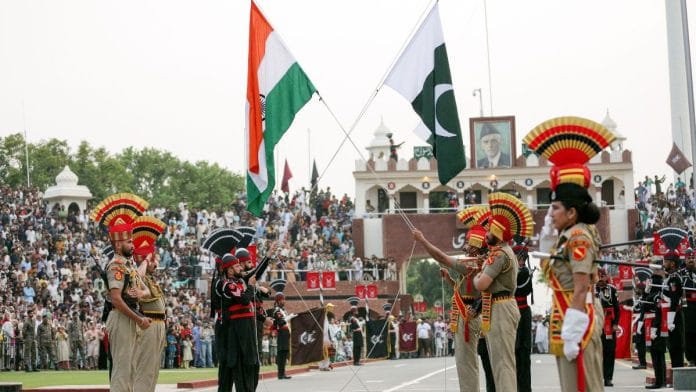Pakistan Army’s appearance, perceived or actual, is an Indian policymaker’s nightmare. And when it happens in India’s neighbouring countries—such as in Dhaka—New Delhi’s antennas become even stiffer. All ulterior motives are placed at the doors of the Pakistan Army, for India’s experience over the decades has been overwhelmingly negative. Repeated attempts have been made to rectify the India-Pakistan quagmire, and all setbacks are invariably held as the handiwork of recalcitrant Generals running the Pakistan Army. After a while, the truth doesn’t really matter since the issues become so much bigger than the stakeholders themselves.
In sheer exasperation, the Dhaka shock echoed the Kabul of 15 August 2021, for the simple reason that the unseen shadow behind both events was that of the Pakistan Army. The General Headquarters (GHQ) in Rawalpindi and its various departments are being held responsible for transnational events that are always inimical to India’s strategic interests. That they are responsible for each attack in Jammu and Kashmir is sine qua non, bestowing further credibility on an institution that continues to secure its central role in Pakistan. Such assertions culminated in a tactically and logistically outrageous claim that Pakistan had infiltrated hundreds of its commandos into J&K.
Terrorists and their minders in Pakistan have simply benefitted from an enormous human resource vacuum created by the depletion of troops from the south of Pir Panjal owing to the high-altitude standoff with China in Ladakh in May 2020. The upsurge in violence in this sector is not a recent phenomenon and has been commented upon before in these columns as well. Therefore, any sweeping declarations only give the Pakistan Army greater credence than its capability deserves, and are simply exposing its flaws and insufficient institutional knowledge. That insufficiency has also been alluded to here earlier.
Greater awareness is an urgent requirement.
More than a territorial, theological dispute
India and Pakistan have been at each other’s throats since both were escorted into independence on this day in 1947. Territorial disputes have metastasised into showboating over every other activity, from faith to flag-lowering ceremonies. In the meantime, politicians and diplomats have tried to bring the relationship out of its Stone Age reciprocal activities, even as many have continued to light more fires. Spy vs spy tales over caffeine and cutters liven up the covert world continually. But both sides have consistently ignored the silhouette that overlooks this thorny relationship, hoping to deliver the undeliverable, diplomatically.
The unachievable can only be achieved once both sides accept that the dispute is more about the psychology of military insecurity than it is simply territorial or theological. And in that game, the Pakistan Army is the player that matters. The only one who can challenge, play, interact, explain, and ultimately convince GHQ Rawalpindi is Sena Bhawan New Delhi. There is no point denying the fact that the Pakistan Army is the major player in this game, from running the political circus in Islamabad to supposedly sending hundreds of its commandos into J&K. Like all institutions, it has interests.
Also read: India must pause Kargil celebrations. Understand Pakistan Army psychology first
Military-military dialogue is essential
The only Indian institution that can understand those interests is the Indian Army, not because it has similar concerns but because it has a common professional DNA and is the only one continually in contact with its Pakistani counterpart. From trading bullets across the Line of Control as young Lieutenants to serving together in multiple United Nations missions to studying together in coveted foreign military courses and once again eyeball-to-eyeball in higher military formations across the disputed zone, Indian and Pakistani officers know each other far better than civilian authorities believe, or even like to.
Civilian authorities still carry an insecurity vis-a-vis India’s Army and its officers, suspecting it of being covertly conniving. Nothing is further from the truth; there are a million sociological and professional reasons as to why it isn’t a possibility in India. But that is not the case in Pakistan, where civilian authorities have an intense dislike for the Army officer cadre—a sentiment that is amply reciprocated by the GHQ top brass. Since it is the major player in Pakistan, and certain to remain the centre of gravity, it is time for those who understand it to engage with it.
Indians have long taken to grandstanding democratic credentials and chafing at the thought of engaging coup planners like the Pakistan Army. But this sermonising hasn’t gotten India any diplomatic progress nor earned it any brownie points. It’s time to be realistic and open a dialogue with those New Delhi considers the perennial spoilers, and none better than the Indian Army to do that. Since it’s the only institution that has never failed to pull New Delhi’s chestnuts out of the fire, it will certainly do so again. A military-military dialogue is essential today; it’s common sense and a politically mature statement.
Manvendra Singh is a BJP leader, Editor-in-Chief of Defence & Security Alert and Chairman, Soldier Welfare Advisory Committee, Rajasthan. He tweets @ManvendraJasol. Views are personal.
(Edited by Zoya Bhatti)







Are you insane. Comparing Indian Army to Pak army which is nothing but a jihadist force. Their actions in Kargil war, BAT just shows what sick people they are as are rest of the Pakis.
Please don’t demean our forces by comparing them to such shameless and fanatic organisation
Why only armies. People as well. Have never posted a comment against Pakistan, more so its people, in my life.